Archaeologists have discovered a 3,000-year-old Bronze Age settlement beneath Lake Lucerne near the city of Lucerne in central Switzerland.
On behalf of the Canton Archaeology of Lucerne, a team of underwater archaeologists from the Office for Urban Development of the City of Zurich made the discovery whilst supporting dredging works in preparation for the construction of a pipeline.
Lake Lucerne is a 114 km² freshwater lake that reaches depths of up to 434 metres. During the 15th century, the Krienbach River carried large amounts of rubble and debris towards the River Reuss restricting the lake outflow.
In combination with more recent human activity, the lake’s water level has risen by around 5 metres and submerged any archaeological remains on the shallow lake basin.
To date, there has been no previous evidence of submerged settlements within the Lake Lucerne area, as the lakebed consists of thick layers of deposited mud that can only be investigated during larger construction projects.
Since December 2019, the team of underwater archaeologists has been documenting the trench sections construction crews have excavated for laying the pipeline.
As early as March 2020, the excavator lifted numerous wooden piles from the water in addition to alluvial sediments and ceramic sherds. Archaeologists identified that the artificially prepared piles were prehistoric timber from an early pile dwelling (or stilt house) village.
Samples of the timbers and ceramics were sent away for Carbon-14 dating, a method for determining the age of an object containing organic material. The results revealed that the village dates from around 1000 BC, making the Bronze Age village the earliest recorded human settlement in the Lucerne area.
Header Image Credit : Google Earth – Map data ©2021 Google





